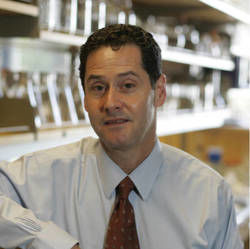Call Now Open
2026 Oxford-Harrington Rare Disease Scholar Award

Neuroscience
Development of a Novel Therapeutic Approach to Treat Neonatal Brain Injury, Down Syndrome and Stroke
2014 Harrington Scholar-Innovator
David Rowitch, MD, PhD, spends his days and often his nights taking care of the tiniest, most fragile patients – preterm infants.
His dedication to helping his little patients survive and thrive has led Dr. Rowitch, Chief of Neonatology and Professor of Pediatrics and Neurological Surgery at the University of California – San Francisco (UCSF), to be a pioneer in his field. During his residency and fellowship at Children's Hospital in Boston, the importance of brain injuries suffered by newborns, which can have lifelong consequences, captured his interest. Soon after completing his training in pediatrics, he established a neurosciences lab at Dana-Farber Cancer Institute (Harvard School of Medicine).
In 2006, he moved to UCSF to begin a research program focused on newborn brain injury. With pediatric neurologist Donna Ferriero, MD, he co-directs the Newborn Brain Research Institute and opened the nation's first Neuro-Intensive Care Nursery at UCSF Benioff Children's Hospital, providing special care for babies with neurological injuries. At UCSF, in collaboration with neuroscientist Arturo Alvarez-Buylla, PhD, he performed the first detailed molecular analyses of autopsied human brains to better understand neurologic development and how it is impacted by injury.
The daily realities of trying to save babies push Dr. Rowitch to pursue practical and clinical applications for his basic science discoveries. “Day to day I am resuscitating babies, but I cannot guarantee they will have the best long-term outcome,” he says.
Dr. Rowitch cites statistics that report a 25 to 50 percent risk of learning deficits and other cognitive problems in premature infants. “Premature babies are very vulnerable,” he explains. “They face a high risk of brain injury from inflammation, infection or oxygen deprivation because their lungs are not fully developed.” Ironically, steroids given to preemies after they are born to help their breathing can damage the developing brain.
Despite advances in other areas of neonatal medicine, knowledge about brain development in very young infants is still sketchy, Dr. Rowitch notes. Motivated by the desire to help preemies get the best possible start in life, he hopes to develop a drug that protects their brains from harm and allows them to develop normally.
By investigating genetic factors that control brain development and the brain's response to injury, he and colleagues in the UCSF Newborn Brain Research Institute were able to zero in on a particular biologic pathway that normally protects the developing brain. When injury to an infant's brain disrupts that pathway, it prevents normal brain growth and neurologic development.
Within two years of that discovery, Dr. Rowitch and his team identified a drug that can protect the preemie brain from injury. He believes it will reduce the risk of cerebral palsy and other neurologic damage.
“The drug works in the laboratory, now we need to know if it is safe for infants and can it work against low oxygen and steroids,” he explains. “Once we answer these basic questions with the support of the Harrington Discovery Institute, the momentum is building for it to go into human testing.”
In a career studded with firsts, this could be one of Dr. Rowitch's most important.
Source: Article from 2013-14 Annual Publication.